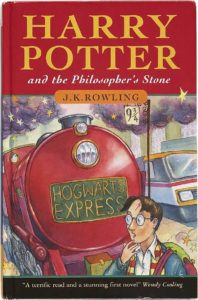 I was a bit of a book snob in my younger years and eschewed Harry Potter, buying in to all the other snobby things that were said about JK Rowling – that she was a pedestrian writer, that it was infantile for adults to read the Potter books, that the best thing you could say about Rowling was that she got kids reading.
I was a bit of a book snob in my younger years and eschewed Harry Potter, buying in to all the other snobby things that were said about JK Rowling – that she was a pedestrian writer, that it was infantile for adults to read the Potter books, that the best thing you could say about Rowling was that she got kids reading.
Of course there is something annoying about one writer becoming so incredibly wealthy and feted, while other fantasy writers, arguably just as good, sold many fewer books and were much less well-known. There is something not right about a publishing industry that concentrates so much on a small number of authors who they promote to the hilt, while letting others wither. But all this should not have stopped me giving the Potter books a go.
I’m sure I would have been hooked, even back then. I remember a co-worker suggesting I buy The Philosophers Stone for one of my young nephews when it first came out. I dropped in to Better Read Than Dead in Newtown but thought the cover looked silly and 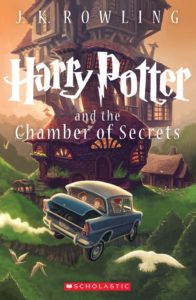 comicky and didn’t buy it (the publishers did recognise this fact and put out various editions so that adults and older readers wouldn’t be embarrassed to be seen reading them). I bought The Subtle Knife instead and so got us all hooked on Philip Pullman’s His Dark Materials series (equally fantastic).
comicky and didn’t buy it (the publishers did recognise this fact and put out various editions so that adults and older readers wouldn’t be embarrassed to be seen reading them). I bought The Subtle Knife instead and so got us all hooked on Philip Pullman’s His Dark Materials series (equally fantastic).
Anyhow if I had become a Potter fan in 1997, like everyone else I would have had to wait a year or two between instalments (how on earth did all the kids bear that?). So in 2015 I finally got around to reading a second-hand copy of The Philosopher’s Stone that I had in the bookshelf for years. I was then ushered in to the mysteriously enveloping world of the Potterverse, as they like to call it. How on earth does she do it? What exactly is it about Harry Potter than is so utterly absorbing? I don’t know that I exactly have the answer because, in my opinion, what shouldn’t work, does absolutely, without a doubt.
I will note that with the later books, it did take me longer to get into the story but after 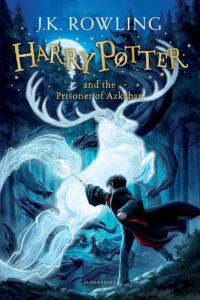 fifty or sixty pages, she always had me hooked. It’s like a big wave comes over you and you’re in.
fifty or sixty pages, she always had me hooked. It’s like a big wave comes over you and you’re in.
So, what is it? Some of it is the misunderstood child – the child with special abilities shunned by their society (the Dursleys) having to find their place. In the beginning Harry is totally at sea, not knowing that he is from wizarding stock. Like the reader, he has to find out all about the new world of Hogwarts and the fun really begins in Diagon Alley when he has to select a wand, gets his robes, cauldron, owl etc.
The beautifully detailed world of Hogwarts is the next deeply satisfying element. Rowling creates a wonderfully described world, the type of school everyone would have liked to have gone to. Who doesn’t desire a dining hall where the ceiling dissolves to show the night sky above, where candelabras hover and scrumptious food magically appears on plates?
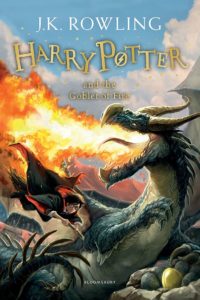 Harry, despite his scar and the mystery surrounding his birth, or perhaps because of it, is an outsider. He hooks up with two other outsiders, the bookish, too-serious Hermione and the fairly inept, lacking-in-confidence Ron. I loved Hermione and identified with her wanting to make the most out of what Hogwarts offered – the classes: ‘potions’, ‘herbology’, ‘transfiguration’, ‘charms’, ‘divination’, ‘care of magical creatures’ and of course ‘defence against the dark arts’ are some of the most fun aspects of the books (not to mention the fun to be had with the spells and their latinese names lumos, expelliarmus, protego, leviosa, reparo – so hard learnt in the early books and then used as second-nature in the later ones). Ron, I wasn’t so keen on but I saw, in the end, how his humour and matter-of-factness was a necessary aid to Harry as the books become darker and he comes to realise the full, terrible intent of his fight with Voldemort.
Harry, despite his scar and the mystery surrounding his birth, or perhaps because of it, is an outsider. He hooks up with two other outsiders, the bookish, too-serious Hermione and the fairly inept, lacking-in-confidence Ron. I loved Hermione and identified with her wanting to make the most out of what Hogwarts offered – the classes: ‘potions’, ‘herbology’, ‘transfiguration’, ‘charms’, ‘divination’, ‘care of magical creatures’ and of course ‘defence against the dark arts’ are some of the most fun aspects of the books (not to mention the fun to be had with the spells and their latinese names lumos, expelliarmus, protego, leviosa, reparo – so hard learnt in the early books and then used as second-nature in the later ones). Ron, I wasn’t so keen on but I saw, in the end, how his humour and matter-of-factness was a necessary aid to Harry as the books become darker and he comes to realise the full, terrible intent of his fight with Voldemort.
The other thing that is so satisfying is the way Rowling puts the books together. Each book is excellently plotted with its own complex mystery to be solved, but the sense of an 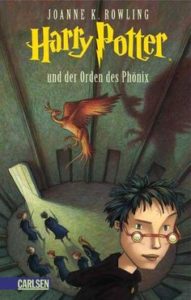 overarching purpose is maintained. I was always a bit confused about how the Hogwarts/wizarding world fitted in with the ordinary (muggle) world but Rowling does explain this as the books progress. The whole narrative, that eventually brings in the backstory of Harry’s parents, Dumbeldore and Voldemort, is a huge, complex jigsaw puzzle that, in the end, you realise Rowling was totally in control of. (By the way, this is something that is missed in the films. Maybe it was because things had to be telegraphed to get into two or three hours, but it was hard to tell what was going on for most of the time. There was much that was fantastic about the characters in the films – Rickman as Snape, Smith as McGonnagall, both Dumbledores, and the three of Harry, Ron and Hermione were spot on – and the set design/mis en scene was wonderful – but the actual storyline??)
overarching purpose is maintained. I was always a bit confused about how the Hogwarts/wizarding world fitted in with the ordinary (muggle) world but Rowling does explain this as the books progress. The whole narrative, that eventually brings in the backstory of Harry’s parents, Dumbeldore and Voldemort, is a huge, complex jigsaw puzzle that, in the end, you realise Rowling was totally in control of. (By the way, this is something that is missed in the films. Maybe it was because things had to be telegraphed to get into two or three hours, but it was hard to tell what was going on for most of the time. There was much that was fantastic about the characters in the films – Rickman as Snape, Smith as McGonnagall, both Dumbledores, and the three of Harry, Ron and Hermione were spot on – and the set design/mis en scene was wonderful – but the actual storyline??)
Does that explain it? Does Rowling key into the tropes of the hero’s journey, the story that is supposed to be hardwired into our consciousness – you know: the call to a quest, the 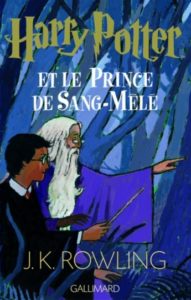 refusal, the mentor, the cave, realisation, the facing of the enemy, the return etc.? Of course she does but so do many other writers who have not achieved her fame.
refusal, the mentor, the cave, realisation, the facing of the enemy, the return etc.? Of course she does but so do many other writers who have not achieved her fame.
I feel it is more about the strong pull of childhood when we are free of responsibilities and can live in the imagination. Boarding school (for all its horrors in the real world) it a place away from the restrictive world of parents where we can be actualised as individuals, where new possibilities open up to us. I believe we are all terribly nostalgic for that time. I know I am.
Farewell Potterverse (sniff).

